| Listing 1 - 10 of 11 | << page >> |
Sort by
|
Book
ISBN: 9211042100 Year: 1987 Volume: vol 17 Publisher: New York (N.Y.): United Nations
Abstract | Keywords | Export | Availability | Bookmark
 Loading...
Loading...Choose an application
- Reference Manager
- EndNote
- RefWorks (Direct export to RefWorks)
Aide internationale --- Aide à l'étranger --- Collaboration internationale --- Cooperation [international ] --- Coopération bilatérale --- Coopération internationale --- Coopération interrégionale --- Coopération multilatérale --- Coopération régionale --- Cours d'eau internationaux --- Gestion du bassin hydrographique --- Global governance --- Institutions [international ] --- Institutions internationales --- Interdependence of nations --- International cooperation --- International institutions --- International rivers --- Internationale samenwerking --- Internationale waterwegen --- Stroomgebieden--Beheer --- Watershed management --- World government --- World order --- Water resources development --- -International rivers --- Energy development --- Natural resources --- Water-supply --- Rivers, Right of navigation of --- Rivers --- Law and legislation
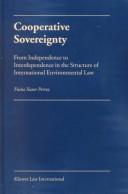
ISBN: 9041114262 9004478132 9789041114266 9789004478138 Year: 2000 Publisher: The Hague Kluwer law international
Abstract | Keywords | Export | Availability | Bookmark
 Loading...
Loading...Choose an application
- Reference Manager
- EndNote
- RefWorks (Direct export to RefWorks)
In the late 20th century, it has become widely accepted that States need to cooperate in order to pursue effectively their interests within the increasingly interdependent world order. At the same time, the principle of sovereignty is still often invoked as a claim for independence and a justification for non-cooperation. This book goes beyond that traditional understanding to develop a new theory which holds that cooperation between States is not an independent principle supplementing State sovereignty or even a counterweight to State sovereignty. Rather, cooperation should be conceived an element of the very notion of sovereignty itself. Sovereignty is not a negative principle meaning merely State independence and freedom, but it also inherently includes a positive element which stresses a State's innate membership in the international community and its authority, its responsibility, its duty to participate actively in that community. In short, sovereignty not only means independence, it also means a responsibility to cooperate. The first part of the book traces the history of the principle of sovereignty from the theories of Grotius and Francisco de Vitoria to the modern understanding of the principle in the light of the United Nations system. The second part of the book poses challenges to the traditional concept of sovereignty in the light of the 20th century interdependence, and the third part goes on to formulate a new theory which takes into account the principles of customary law and treaty law. The conclusions drawn on by the author are refreshing, but may also be controversial, and this book will most definitely contribute to the discussion and development of the principle of sovereignty in international law.
Aide internationale --- Aide à l'étranger --- Collaboration internationale --- Cooperation [international ] --- Coopération bilatérale --- Coopération internationale --- Coopération interrégionale --- Coopération multilatérale --- Coopération régionale --- Global governance --- Institutions [international ] --- Institutions internationales --- Interdependence of nations --- International cooperation --- International institutions --- Internationale samenwerking --- Soevereiniteit --- Souveraineté --- Sovereignty --- World government --- World order --- Sovereignty. --- International cooperation. --- State sovereignty (International relations) --- International law --- Political science --- Common heritage of mankind (International law) --- International relations --- Self-determination, National --- Cooperation, International --- Institutions, International --- Cooperation --- International organization --- Law and legislation
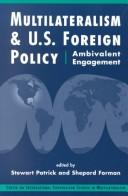
ISBN: 1588260429 1588260186 9781588260420 9781588260185 Year: 2002 Volume: *1 Publisher: Boulder, Colo. Rienner
Abstract | Keywords | Export | Availability | Bookmark
 Loading...
Loading...Choose an application
- Reference Manager
- EndNote
- RefWorks (Direct export to RefWorks)
International relations. Foreign policy --- United States --- Aide internationale --- Aide à l'étranger --- Collaboration internationale --- Cooperation [international ] --- Coopération bilatérale --- Coopération internationale --- Coopération interrégionale --- Coopération multilatérale --- Coopération régionale --- Global governance --- Institutions [international ] --- Institutions internationales --- Interdependence of nations --- International cooperation --- International institutions --- Internationale samenwerking --- World government --- World order --- Foreign relations --- Philosophy --- #SBIB:327H15 --- #SBIB:328H31 --- Cooperation, International --- Institutions, International --- Cooperation --- International relations --- International organization --- Buitenlandse politiek: Noord-Amerika --- Instellingen en beleid: VSA / USA --- -Philosophy. --- -International cooperation. --- International cooperation. --- -International cooperation --- -International relations. Foreign policy --- Philosophy. --- 1989 --- United States - Foreign relations - Philosophy --- United States - Foreign relations - 1989 --- United States of America
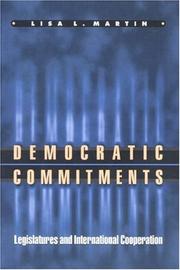
ISBN: 0691009236 0691009244 9786612767104 1282767100 1400823706 9781400823703 9780691009230 9780691009247 1400812615 9781400812615 9781282767102 Year: 2000 Publisher: Princeton, N.J. Princeton University Press
Abstract | Keywords | Export | Availability | Bookmark
 Loading...
Loading...Choose an application
- Reference Manager
- EndNote
- RefWorks (Direct export to RefWorks)
From the refusal of the U.S. Congress to approve fast-track trade authority and certain foreign aid packages to the obstacles placed by Western European parliaments in the path of economic integration, legislatures often interfere with national leaders' efforts to reach and implement predictable international agreements. This seems to give an advantage to dictators, who can bluff with confidence and make decisions without consultation, and many assume that even democratic governments would do better to minimize political dissent and speak foreign policy from a single mouth. In this thoughtful, empirically grounded challenge to the assumption that messy domestic politics undermine democracies' ability to conduct international relations, Lisa Martin argues that legislatures--and particularly the apparently problematic openness of their proceedings--actually serve foreign policy well by giving credibility to the international commitments that are made. Examining the American cases of economic sanctions, the use of executive agreements versus treaties, and food assistance, in addition to the establishment of the European Union, Martin concludes that--if institutionalized--even rancorous domestic conversations between executives and legislatures augment rather than impede states' international dealings. Such interactions strengthen and legitimize states' bargaining positions and international commitments, increasing their capacity to realize international cooperation. By expanding our comprehension of how domestic politics affect international dialogue, this work is a major advance in the field of international relations and critical reading for those who study or forge foreign policy.
International relations. Foreign policy --- International cooperation. --- Legislative bodies --- Legislative bodies. --- Aide internationale --- Aide à l'étranger --- Collaboration internationale --- Cooperation [international ] --- Coopération bilatérale --- Coopération internationale --- Coopération interrégionale --- Coopération multilatérale --- Coopération régionale --- Etats-Unis. Congress --- Global governance --- Institutions [international ] --- Institutions internationales --- Interdependence of nations --- International cooperation --- International institutions --- Internationale samenwerking --- Parlementen --- Parlements --- United States. Congress --- Verenigde Staten. Congress --- World government --- World order --- Legislative bodies -- European Union countries. --- United States. --- United States. Congress. --- European Union countries --- United States. - Congress. --- Bicameralism --- Legislatures --- Parliaments --- Unicameral legislatures --- Constitutional law --- Estates (Social orders) --- Representative government and representation --- Cooperation, International --- Institutions, International --- Cooperation --- International relations --- International organization
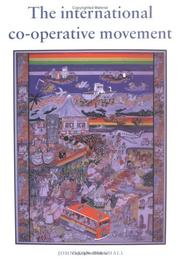
ISBN: 0719048249 Year: 1997 Publisher: Manchester Manchester university press
Abstract | Keywords | Export | Availability | Bookmark
 Loading...
Loading...Choose an application
- Reference Manager
- EndNote
- RefWorks (Direct export to RefWorks)
Aide internationale --- Aide à l'étranger --- Collaboration internationale --- Cooperation [international ] --- Coopération bilatérale --- Coopération internationale --- Coopération interrégionale --- Coopération multilatérale --- Coopération régionale --- Global governance --- Institutions [international ] --- Institutions internationales --- Interdependence of nations --- International cooperation --- International institutions --- Internationale samenwerking --- Internationalism --- Internationalisme --- World government --- World order --- #SBIB:327.4H61 --- coöperatie-wezen (x) --- Europa [werelddeel] --- Afrika [werelddeel] --- Azië [werelddeel] --- Amerika [werelddeel] --- Australië [land in werelddeel Oceanië] --- Derde wereld: economische ontwikkeling --- International cooperation. --- Internationalism. --- Cooperation, International --- Institutions, International --- Intellectual cooperation --- Cosmopolitanism --- International education --- Nationalism --- Cooperation --- International relations --- International organization --- Europe --- Coopération --- Afrique --- Asie --- Amerique
Book
ISBN: 9076101094 Year: 2004 Publisher: Brussels Sint Lucas. Hogeschool voor wetenschap & kunst - School of architecture
Abstract | Keywords | Export | Availability | Bookmark
 Loading...
Loading...Choose an application
- Reference Manager
- EndNote
- RefWorks (Direct export to RefWorks)
Aide internationale --- Aide à l'étranger --- Collaboration internationale --- Cooperation [international ] --- Coopération bilatérale --- Coopération internationale --- Coopération interrégionale --- Coopération multilatérale --- Coopération régionale --- Global governance --- Institutions [international ] --- Institutions internationales --- Interdependence of nations --- International cooperation --- International institutions --- Internationale samenwerking --- World government --- World order --- 373.67 --- Europa --- Latijns-Amerika --- 72.01 --- 373.67(493) --- Architectuurtheorie ; stedenbouw ; verband tussen cultuur en regio --- Architectuurtheorie ; stedenbouw ; onderzoek ; workshops --- Architectuuronderwijs ; Gent ; Sint-Lucasinstituut ; workshops --- Architectuur ; Latijns-Amerika ; Europa ; interculturele workshops --- Architectuuronderwijs --- Onderwijs (architectuur) --- Onderzoek (architectuur) --- Architectuuronderzoek --- Onderzoek (stedenbouw) --- Onderwijs (stedenbouw) --- Architectuur ; theorie, filosofie, esthetica --- Onderwijs ; kunst- architectuuronderwijs ; België --- Architects --- South America --- Europe
Book
ISBN: 9780521749381 9780521765435 0521765439 0521749387 9780511676406 9780511677373 0511677375 9780511681868 0511681860 0511676409 0511683847 9780511683848 1107208742 1282536249 9786612536243 0511678630 0511679882 9781107208742 9781282536241 6612536241 9780511678639 9780511679889 Year: 2010 Publisher: Cambridge New York Cambridge University Press
Abstract | Keywords | Export | Availability | Bookmark
 Loading...
Loading...Choose an application
- Reference Manager
- EndNote
- RefWorks (Direct export to RefWorks)
For over sixty years the United States has been the largest economy and most powerful country in the world. However, there is growing speculation that this era of hegemony is under threat as it faces huge trade deficits, a weaker currency, and stretched military resources. America's Global Advantage argues that, despite these difficulties, the US will maintain its privileged position. In this original and important contribution to a central subject in International Relations, Carla Norrlof challenges the prevailing wisdom that other states benefit more from US hegemony than the United States itself. By analysing America's structural advantages in trade, money, and security, and the ways in which these advantages reinforce one another, Norrlof shows how and why America benefits from being the dominant power in the world. Contrary to predictions of American decline, she argues that American hegemony will endure for the foreseeable future.
Aide internationale --- Aide à l'étranger --- Coexistence --- Collaboration internationale --- Cooperation [international ] --- Coopération bilatérale --- Coopération internationale --- Coopération interrégionale --- Coopération multilatérale --- Coopération régionale --- Coëxistence pacifique --- Foreign affairs --- Foreign policy --- Global governance --- Institutions [international ] --- Institutions internationales --- Interdependence of nations --- International cooperation --- International institutions --- International relations --- Internationale betrekkingen --- Internationale samenwerking --- Ordre mondial --- Peaceful coexistence --- Relations internationales --- Vreedzame coëxistentie --- Wereldorde --- World government --- World order --- Hegemony --- International Cooperation --- International cooperation. --- International relations. --- United States --- Foreign relations --- International affairs --- National security --- Sovereignty --- World politics --- Cooperation, International --- Institutions, International --- Cooperation --- International organization --- Social Sciences --- Political Science --- Hegemony - United States
Book
ISBN: 9264228020 9789264228023 Year: 1986 Volume: vol *152 Publisher: Paris OCDE
Abstract | Keywords | Export | Availability | Bookmark
 Loading...
Loading...Choose an application
- Reference Manager
- EndNote
- RefWorks (Direct export to RefWorks)
339.96 --- 341.232(100-77) --- 341.232.5 --- (100-77) --- $?$89/11 --- AA / International- internationaal --- 338.340 --- Algemene ontwikkeling in de Derde Wereld. --- Development aid. Development cooperation --- Aide internationale --- Aide à l'étranger --- Collaboration internationale --- Cooperation [international ] --- Coopération bilatérale --- Coopération internationale --- Coopération interrégionale --- Coopération multilatérale --- Coopération régionale --- Global governance --- Institutions [international ] --- Institutions internationales --- Interdependence of nations --- International cooperation --- International institutions --- Internationale samenwerking --- World government --- World order --- Economic development projects --- Projets de développement économique --- Projets de développement économique --- Algemene ontwikkeling in de Derde Wereld
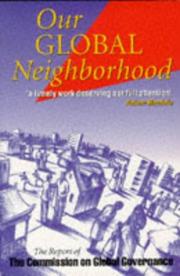
ISBN: 0198279973 0198279981 9780198279976 Year: 1995 Publisher: Oxford University press
Abstract | Keywords | Export | Availability | Bookmark
 Loading...
Loading...Choose an application
- Reference Manager
- EndNote
- RefWorks (Direct export to RefWorks)
International movements --- International economic relations --- Political philosophy. Social philosophy --- Political systems --- International law --- Aide internationale --- Aide à l'étranger --- Coexistence --- Collaboration internationale --- Cooperation [international ] --- Coopération bilatérale --- Coopération internationale --- Coopération interrégionale --- Coopération multilatérale --- Coopération régionale --- Coëxistence pacifique --- Foreign affairs --- Foreign policy --- Global governance --- Institutions [international ] --- Institutions internationales --- Interdependence of nations --- International cooperation --- International institutions --- International relations --- Internationale betrekkingen --- Internationale samenwerking --- Ordre mondial --- Peaceful coexistence --- Relations internationales --- Vreedzame coëxistentie --- Wereldorde --- World government --- World order --- International relations. --- International cooperation. --- Sociale agogiek --- armoedebestrijding en samenlevingsopbouw --- International Cooperation. --- 341.123 --- Foreign relations --- International affairs --- National security --- Sovereignty --- World politics --- Cooperation, International --- Institutions, International --- Cooperation --- International organization --- Verenigde Naties - UNO --- armoedebestrijding en samenlevingsopbouw. --- Coopération internationale --- Environnement --- Problemes de la vie internationale --- Vie internationale

ISBN: 0801486238 0801436567 9780801436567 9780801486234 Year: 1999 Publisher: Ithaca, NY London Cornell University Press
Abstract | Keywords | Export | Availability | Bookmark
 Loading...
Loading...Choose an application
- Reference Manager
- EndNote
- RefWorks (Direct export to RefWorks)
In this book Young extends and generalises his earlier work on international environmental regimes to present a comprehensive account of the current status and future prospects of regime theory as a way of thinking about governance in world affairs.
Aide internationale --- Aide à l'étranger --- Coexistence --- Collaboration internationale --- Colonialism --- Cooperation [international ] --- Coopération bilatérale --- Coopération internationale --- Coopération interrégionale --- Coopération multilatérale --- Coopération régionale --- Coëxistence pacifique --- Foreign affairs --- Foreign policy --- Global governance --- Histoire politique --- Institutions [international ] --- Institutions internationales --- Interdependence of nations --- International cooperation --- International institutions --- International politics --- International relations --- Internationale betrekkingen --- Internationale politiek --- Internationale samenwerking --- Ordre mondial --- Peaceful coexistence --- Political history --- Politics [International ] --- Politics [World ] --- Politiek [Internationale ] --- Politieke geschiedenis --- Politique internationale --- Relations internationales --- Vreedzame coëxistentie --- Wereldorde --- World government --- World order --- World politics --- International relations. --- World politics. --- International cooperation. --- Cooperation, International --- Institutions, International --- Cooperation --- International organization --- Global politics --- Political science --- World history --- Eastern question --- Geopolitics --- Foreign relations --- International affairs --- National security --- Sovereignty --- #SBIB:327.1H10 --- Internationale betrekkingen: theorieën
| Listing 1 - 10 of 11 | << page >> |
Sort by
|

 Search
Search Feedback
Feedback About UniCat
About UniCat  Help
Help News
News